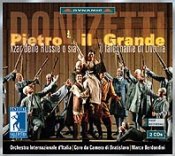It was the fourth of Donizetti’s operas to be performed during his life, and the first of Donizetti’s to achieve any kind of performance history. It had at least seven stagings by 1827 , when its last known performance in the 19th century took place. It was neglected until 2003 when it was given in St. Petersburg. It was on the same subject as Pacini’s Falegname di Livonia, although the latter had a much better record of performances between its premiere (also in 1819) and 1840, when it was last heard. The Pacini work had an unusual total of 47 performances at La Scala in its premiere run, and was to have close to 40 more stagings. As a matter of fact, throughout the 1820s, it was Pacini rather than Bellini, Donizetti or Mercadante who gave Rossini the biggest competition in Italy.
The plot of Pietro il Grande is relatively simple. Carlo, a carpenter in an unnamed town in Livonia (Latvia), which was then under Russian rule, is in love with the orphan Annetta who also lives in the town. Carlo claims to be of noble origin and shows that he has a bit of a temper when the tsar and his wife, Caterina, arrive, both traveling incognito. They are looking for the tsarina’s lost brother, and have reason to suspect that it might be Carlo. The tsar asks the innkeeper, Madame Fritz, about this carpenter, when Carlo enters. Carlo, not knowing who the stranger is, is rather insolent to him, and an argument ensues, with Peter threatening Carlo with dire consequences. The town magistrate , Ser Cuccupis, also gets into an argument with Peter. This magistrate has pretensions of grandeur. Not knowing who the stranger is, he goes so far as to threaten him with his friend, the tsar. Peter decides to pull rank on the magistrate, and tells him that he is Menzikoff, a high officer of the tsar. The magistrate has Carlo imprisoned. The latter is about to be convicted when Madame Fritz runs in with some documents proving that he is Catherine’s brother. Carlo is not told this until Act II, at which time he introduces the girl to the imperial couple. He warns them that the tsar must never see her since she is the daughter of the traitor Mazeppa (the subject of several operas). When told that Mazeppa is dead, Menzikoff pardons the girl. The captain of the troops tells the magistrate that Menzikoff is actually the tsar. The magistrate sees an opportunity to advance himself, but since the tsar has already recognized him for what he is, he fires him from his position of authority and orders him to pay a fine. Peter, Catherine, Carlo and Annetta leave happily for St. Petersburg.
Donizetti was to write a second opera on Peter the Great’s incognito travels some eight years later (1827). The details of the plot differ, although the tenor is again a carpenter (falegname), the buffo becomes the town mayor rather than a magistrate, and the heroine the mayor’s daughter rather than an orphan. The action takes place at the seaport of Zaandam in Holland,, rather than the town in Livonia (Latvia). This second Donizetti work on the subject, Il Borgomastro di Saardam was to be less successful than the first, although the same plot was used in 1837 by Albert Lortzing for his tremendously successful Zar und Zimmermann . Another 17 years were to pass before Meyerbeer put his oar in with L’etoile du Nord , where Peter and Catherine first fall in love, not surprisingly, the tsar also starts out incognito in this work, in his customary disguise as a carpenter.
When I was first asked to review this recording, I expected a very Rossinian opera buffo. It is, to a large extent, but I was still able to see tiny glimpses of Donizetti’s own personality come shining through. An example is the lyric pathos of Annetta’s “veder l’amato bene” in the finale to Act I. There are other lovely numbers, including the duet for Pietro and the Magistrate: “Ser Decuppia siete voi”, definitely a forerunner of the delightful “Cheti, cheti” in Don Pasquale and Carlo’s aria “Il dolce nome e tenero”.
Martina Franca often uses unfamiliar, but talented young singers, as is the case here. I particularly enjoyed the Madame Fritz of Rosa Anna Peraino, the Pietro of Vito Priante and the intentionally obnoxious Magistrate of Giulio Mastrototaro. But the entire cast contributes to the success of the performance.
Still, if I may make a suggestion for future Dynamic releases of operas of the period, the consistency between the tabulation of the tracks on the CDs and the cast list could stand a little more attention. Thus, looking at the tabulation on pages 2 and 3, we see several “numbers” sung by the “Magistrato”. But there is no “Magistrato” in the cast list on page 1 — instead, he is listed under his other name of Ser Cuccupis.
Martina Franca has a long history of reviving long forgotten works, often giving these as part of a series with a thread in common. Perhaps they will give Peter the Great the same treatment, and revive Pacini’s Falegname di Livonia , Donizetti’s Borgomastro di Saardam, and Meyerbeer’s Etoile du Nord . Hopefully, if such a revival of operas dealing with Peter the Great takes place, they will all be recorded by Dynamic
This is a recording I can recommend not only to Donizetti completists, but to all who appreciate Italian opera
Tom Kaufman
